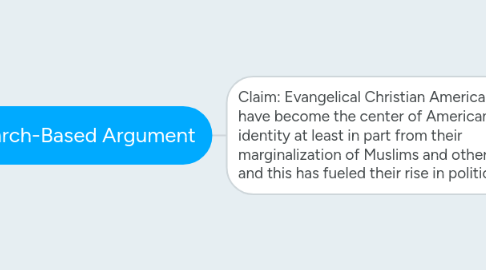
1. Claim: Evangelical Christian Americans have become the center of American identity at least in part from their marginalization of Muslims and others, and this has fueled their rise in politics.
1.1. Introduction
1.1.1. Already written
1.2. Subclaim 1: Evangelical Christians have situated themselves at the center of American identity by acting as the agent of discrimination, creating a new Cold War dichotomy.
1.2.1. A. Many ECs fuel discrimination
1.2.1.1. Quotes about Islam from evangelicals
1.2.1.1.1. Can pull material from the TiC about Mohammed being a "demon possessed pedophile", wanting an explicit "war on Islam" etc. 1-1.5 pghs.
1.2.1.2. More points about the discrimination and its source, including p96 of Mahmood (0.5-1pghs)
1.2.1.2.1. Possibly if fits, include a small additional note about the role of ECs in the Israel-Palestine conflict
1.2.2. B. A new dichotomy has come about, e.g. Trump's speeches, Obama as a Muslim, etc.
1.2.2.1. Reference Times article
1.2.2.1.1. Why people are angry about it - establish the racism behind the movement and possibly compare it to similar conspiracies in the past if any research magically appears...(1pgh)
1.2.2.1.2. Also Gaurdian Article
1.2.2.2. Integrate Dyson reading quotes into this point
1.2.2.2.1. Dyson's commentary about why Obama couldn't get anything done
1.2.3. C. This dichotomy is closely related to or the same as the one that appeared in the Cold War and with American identity, except now it is with ECs instead of the suburban nuclear family.
1.2.3.1. This is more of an abstract point, but can still quote from the readings from class and others about evangelicals in particular (1pgh)
1.2.3.1.1. "distinctions between Other and Same"
1.2.3.1.2. The Scandal of Evangelical Politics
1.3. Subclaim 2: At the same time, evangelical Christians have become a main emphasis in politics and in the American sphere; being the most "American" as a politician no longer means being the least like the Soviets; now it means being least like a Muslim, i.e. evangelical Christian.
1.3.1. A. as recently as the 1960s, religion was emphasized but with no emphasis on the new, somewhat radical, non-traditional sects of today
1.3.1.1. Use The Scandal of Evangelical Politics as an academic perspective
1.3.1.2. Christianity and Modern Democracy as a Christian perspective
1.3.2. B. Now, as particularly evidenced in Republican primaries, evangelicals are almost worshipped politically
1.3.2.1. First establish the fallacy of religious participation and religious rhetoric using the Jennings article
1.3.2.2. "Winning with Evangelicals"
1.3.2.3. Tie in to the current election with "Trump's God Machine"
1.3.3. C. Overall, it is politically beneficial to target the support of evangelicals despite their being a minority and having fairly extreme political views.
1.3.3.1. Again - a rather abstract point at the end of the section. But will still need some supporting quotations and references, in part referring back to the points already made and also having support for the "extreme political views" etc from the Pew report and stuff
1.4. Subclaim 3: These two events have a causal relationship. In particular, the centering of the American identity around evangelical Christianity has clear consequences in the identity politics of today and politics and politicians has responded. Furthermore, many Americans want to associate themselves as closely as possible with this central American identity.
1.4.1. A. Relationship between the two makes sense given the recent rise of identity politics in America
1.4.1.1. Support for the rise of identity politics in America after 9/11
1.4.1.1.1. Ajrouch Article
1.4.1.2. Abstract argument for the correlation between the two: the warrant/link lies in the political views of evangelicals
1.4.2. B. Conclusion: This suggests a sort of "group Darwinism:" the groups that discriminate will rise and become more prominent by nature, even if they start out near the fringe (second example: alt-right today)
1.4.2.1. Refer back to previous sources and wrap up from preceding content
1.4.3. C. Therefore, to combat discrimination, we cannot ignore those on the fringe, no matter how small and "out there" their views seem.
1.4.3.1. Conclusion
